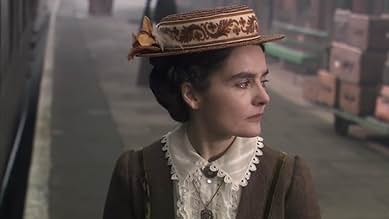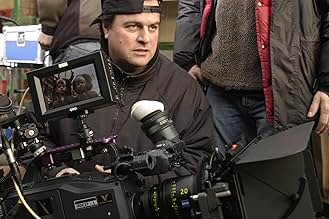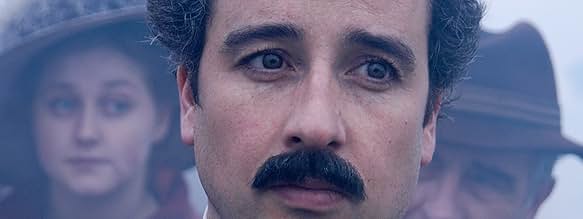This docudrama examines the history of scientific discovery that lead up to Albert Einstein's famous equation E=mc2 and its aftermath in the creation of nuclear energy. This includes Faraday... Read allThis docudrama examines the history of scientific discovery that lead up to Albert Einstein's famous equation E=mc2 and its aftermath in the creation of nuclear energy. This includes Faraday's discovery of electromagnetic fields; Antoine Lavoisier's discovery that mass is never l... Read allThis docudrama examines the history of scientific discovery that lead up to Albert Einstein's famous equation E=mc2 and its aftermath in the creation of nuclear energy. This includes Faraday's discovery of electromagnetic fields; Antoine Lavoisier's discovery that mass is never lost; and Emilie du Chatelet's demonstration that Newton's calculation of the velocity of a... Read all
- Director
- Writers
- Stars
- Humphry Davy
- (as Sam West)
- Professeur Fritz Muhlberg
- (as Mike Sarne)
- Director
- Writers
- All cast & crew
- Production, box office & more at IMDbPro
Featured reviews
I want to find out how to contact the producers of this show to commend them on it!
What is it about? Well, it is not a biography of Einstein, as the title might make you think. It is a history of the idea of E=mc2 and where is came from. Einstein is just a cog in an angrenage of people that made it possible.
What is even better is that the science is made accessible and not just story told. It was a small revelation, but a revelation nonetheless, when the narrator asked "if you put pore energy into the movement of an object it moves faster, but it cannot move faster than the speed of light, no matter how much energy you put in. WHERE does the energy go?" and I finally understood why things have to get heavier as they reach the speed of light.
As for the role of women as brainy visionaries, why not? As long as the story is accurate, the empowerment of women as a byproduct is irrelevant.
I have to agree with some other users when I acknowledge that the subject behind this docu-drama is fascinating but I must take issue with claims that this is a "great film" and all the "10 out of 10" votes that it has received on this site because the film itself is not worthy of the subject. It is hard not to be engaged by the basic history being delivered here, although it must be said that it is perhaps far too basic to be enjoyed by anyone who knows anything about the subject (which I pretty much don't). However it is the delivery that is the problem because this film is yet another in a recent spate of docu-dramas where dramatisations deliver history while experts contribute to flesh out the detail. Sadly, like other docu-dramas on channel 4 recently, the film relies too heavily on averagely acted dramatisations and not enough on the experts who are informed and passionate about the subject. The latter have just enough time to do the job (along with the narration) but the dramatisations are far too heavy and not helped at all by the score constantly pushing it to come across as more dramatic and exciting than it actually is. Often it seemed that the producers didn't totally trust the detail to be engaging enough.
Narrator Ecceleston veers between these two extremes. At times he provides solid narration but at others he tends towards hyping up the story for no real reason. The cast are reasonably mixed. Their performances are all good enough to act as a televisual live-exhibit (which is really what they are) but not good enough to do any more than this with a script that never required them to anyone. In fairness nobody is "bad" but it is hard to get past the fact that the narration and expert contributors are much more interesting and frustratingly given much less time to do their thing.
Overall then this is an OK film. It succeeds not on its own merits but on the value of the history and the people involved in developing the great ideas that we are swept through. Aiming for a wider audience is no bad thing but it is a shame that the film never lets the experts go into too much detail or to delve too deep, preferring instead to overdo the dramatisations. It will still be enough to engage some viewers but the lack of detail and the overdone re-enactments will put many off, as their main contribution is to distract rather than enrich.
But enough of all those things. For as long as I remember, Albert Eistein was this slow-learner as a child but then went on to achieve later in life of what is probably one of the world's most famous equation in the history of science.
So imagine it was a real eye-opener to me as to how he really got his equation as I watched the show. It was pretty amazing that learning from what others did, he improved on it and it eventually led to the equation all of us knew since. As my knowledge on physics is very basic, it can be a little hard just to read the dry texts on my past Physics textbook. But when this was aired some time back here, it was something I so want to watch. Though I never study in my Physics syllabus about the famous equation, I had learnt and heard about its legacy to the world nowadays through my father who is more aware of it. It was mentioned on the show too.
Other than how Eistein got the equation, it even touched about his private life as well. Another aspect where it opened my eyes as well.
My final say? It's just basically what I had given the title to this review.
I believe there are psychological sex differences, but we can't settle on what they are. That which is statistically measured (e.g., responses to questionnaires) may be trivial. Or the difference may be of great and obvious universal significance (e.g. anatomical and motivational aspects of the sex act).
Considering the obstacles to intellectual achievement and communication, that women were depicted in the program is a tribute to what may ultimately turn out to be a true statistical female intellectual superiority. There are some signs of it among school children. Or there may not be. It is hard to hold impinging variables constant. One thing is certain: women have been more capable than formerly they were almost universally believed to be.
In addition to social obstacles there was our dangerous biological role (which is much safer today). But what is allowable or encouraged differs greatly in different parts of the world. It has also changed greatly during the seven decades of my lifetime in this culture.
Did you know
- TriviaThe movie was made to commemorate the 100th anniversary of the publication of Albert Einstein's paper in which he first outlined the theory of relativity.
- ConnectionsFeatures Nova: E=mc²: Einstein's Big Idea (2005)
Details
- Release date
- Countries of origin
- Official sites
- Language
- Also known as
- Великая идея Эйнштейна
- Filming locations
- Production companies
- See more company credits at IMDbPro































